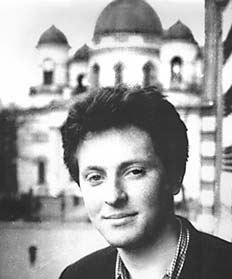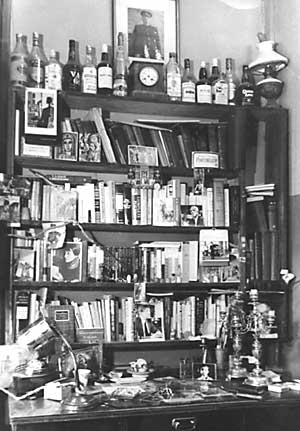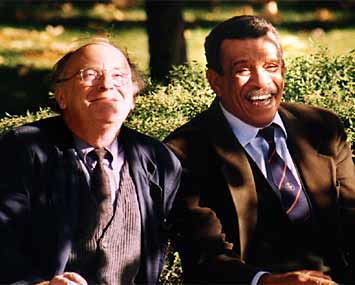Joseph Brodsky
Article

Joseph Brodsky: A Virgilian Hero, Doomed Never to Return Home
by Bengt Jangfeldt*
This article was published on 12 December 2003.
“All my poems are more or less about the same thing – about Time. About what time does to Man.” – Joseph Brodsky
Rebel Poet
It is impossible to speak about Russian literature without taking into account the society in which it was written. This is especially true for the 20th century, when five Russian writers were awarded the Nobel Prize. When the émigré writer Ivan Bunin got it in 1933, the Swedish Academy was reproached for not having awarded the prize to the pro-Soviet Maxim Gorki; Boris Pasternak‘s prize, in 1958, was fiercely attacked by the Soviet authorities as a political, anti-Soviet act; Mikhail Sholokhov‘s, seven years later, was criticized for being, in its turn, a conciliatory gesture toward the Soviet regime; and Aleksandr Solzhenitsyn‘s award (1970) was conceived in the same vein as the prize to Pasternak.

Iosif Brodskiy photographed by his father, Alexandr Brodskiy, on the balcony of their apartment in Leningrad in 1958.
Photo: Courtesy of Mikhail Miltchik, St. Petersburg
When Joseph Brodsky was awarded the Nobel Prize in 1987, times were changing. The Soviet Union was opening up, but the authorities were still not able to cope with the fact that a Russian writer had got the prize, and it was announced with great delay.
Iosif Brodskiy was born in Leningrad in 1940 and died in New York in 1996 as Joseph Brodsky. Between the two spellings of his name lies one of the more dramatic human and poetic destinies in 20th century Russia – a country rich in drama.
Iosif Brodskiy grew up in the Soviet Union, first during the Stalinist era, then under the milder political climate of Khrushchev and Brezhnev. He started to write poetry at the end of the 1950s, but like everybody else who refused to accept the Soviet aesthetic norms he encountered great difficulties and could only publish a few poems.
Brodskiy revolutionised Russian poetry by introducing themes that were taboo in the Soviet Union, first of all metaphysical and Biblical ones. And he did it in a verse that was both innovative and exceptionally varied. Influenced by his Russian 18th century precursors (first of all Derzhavin), as well as by Polish poets (Galczynski, Norwid) and the English Metaphysicals (Donne, Herbert, Marvell), Brodskiy enriched Russian literature with a new ironic sensibility. The conspicuous use of literary reminiscences and allusions could perhaps be seen as a result of his growing up in almost total cultural isolation, where every alternative voice was eagerly absorbed.
In the Soviet Union such things did not go unpunished. The young poet was regarded as a rebel and a parasite: he was arrested and, after a parody of a trial, in 1964 exiled to northern Russia to think better of it. This he did, but not in the way the authorities had wished. During his exile he developed his poetic technique and ripened as a poet. And thanks to protests from Soviet and Western intellectuals, he was set free in 1965, before the end of his term. He returned to his hometown, Leningrad, where he stayed until he was sent into foreign exile in 1972 – this time without trial and for good. He settled in the USA, where he became Joseph Brodsky, an American citizen, and where he lived until his death twenty-four years later.
 |
| Brodskiy during his exile in Northern Russia. Photo: Alexandr Brodskiy Courtesy of Mikhail Miltchik, St. Petersburg |
In the USA, Brodsky continued to write poetry in Russian, and also translated many of his poems into English. If he never reached the same poetic peaks in English as in Russian, he developed instead into a brilliant essayist in English. As a writer Brodsky thus had two identities, and it was in his capacity as one of the greatest Russian poets of the 20th century and a major essayist in the English language that he was acclaimed by the Swedish Academy in 1987 for his “all-embracing authorship, imbued with clarity of thought and poetic intensity”.
Time Is Greater than Space
His first collection of essays, Less Than One, was published in 1986. Some of the best essays were devoted to his great predecessors in Russian poetry – Osip Mandelstam, Anna Akhmatova, and Marina Tsvetayeva. In an essay on Tsvetayeva, Brodsky formulates his view of the poet as a “combination of an instrument and a human being in one person, with the former gradually taking over the latter”.

Brodskiy’s study photographed on June 4, 1972, the same day he was exiled from the Soviet Union.
Photo: Courtesy of Mikhail Miltchik
The poet, transformed gradually into an instrument for his poetic gift, has no choice – and the recognition of this exclusiveness determines his path. By constantly listening to his own voice, constantly developing his language, constantly taking the next stylistic step, he becomes more and more isolated.
Brodsky’s words about Tsvetayeva are a self-characterisation. Brodsky the poet is led farther and farther away from the literary mainstream by language itself. And Brodsky the man, grown up in a society with whose values he cannot reconcile himself and which refuses to accept him, is, like Tsvetayeva and Mandelstam, forced into a growing social alienation. The exile to northern Russia and his expatriation eight years later are but outer confirmations of an inner process that in other countries would have taken less dramatic turns.
In the poem “Lullaby of Cape Cod” (1975), Brodsky describes his “move” to the USA as a “change of Empire”. However shattering this experience may be, it changes nothing in essence. Empires have always existed and resemble one another, if not in detail (one empire can, of course, be more repugnant than the other), then at least in structure – and as regards man’s place in this structure. Although Brodsky was heavily marked by his Soviet experience, he had no illusions about other political systems being able to provide a perfect alternative. The big enemy is not space but time.
It is Brodsky’s approach to time that determines his worldview. “What interests me and always has interested me most is time and its effect on man, how it changes him, grinds him… On the other hand, this is just a metaphor for what time does to space and the world.” Time reigns supreme – all that is not time is subjected to the power of time, “the ruler”, “the owner”. Time is the enemy of man and everything man has created and holds dear: “Ruins are the triumph of oxygen and time.”
Time clings to man, who grows older, dies and turns into “dust” – “time’s flesh”, as Brodsky calls it. Key words in his poetry are “splinter”, “shard”, “fragment”. One of his books of poetry is called A Part of Speech. Man – in particular, a poet – is a part of a language that is older than he and will live on after time has settled the account with language’s servant.
Man is attacked both by the past and the future. What we experience as unpleasant and negative in life is, as a matter of fact, a cry from the future, which is trying to break ground in the present. The only thing that prevents the future and the past from merging is the short period constituted by the present, symbolised by man and his body in “Ecloque IV: Winter” (1977):
… What sets them apart is only
a warm body. Mule-like, stubborn creature,
it stands firmly between them, rather
like a border guard: stiffened, sternly
preventing the wandering of the futureinto the past. …
On the personal level, Brodsky views life as a “one way street”. A return to what has passed – an earlier life, a woman – is impossible. In “December in Florence” (1976), about Dante and his hometown, about the poet and exile, Florence is double-exposed with another city – Leningrad. There are, writes Brodsky,
… cities one won’t see again. The sun
throws its gold at their frozen windows. But all the same
there is no entry, no proper sum.
There are always six bridges spanning the sluggish river.
There are places where lips touched lips for the first time ever,
or pen pressed paper with real fervor.
There are arcades, colonnades, iron idols that blur your lens.
There the streetcar’s multitudes, jostling, dense,
speak in the tongue of a man who’s departed thence.
In spite of all Communism, “Leningrad”, that is, St. Petersburg, remains “the most beautiful city in the world”. The return is not impossible primarily because of an unpalatable political system – which a superficial reading might suggest – but by deeper, psychological factors: “A man moves only in one direction. And only from. From a place, from a thought that has entered his mind, from himself… that is, constantly away from what has been experienced…”
 |
| Bridges in St. Petersburg (clockwise): Troitsky Bridge, Prachechny Bridge, Bankovsky Bridge, Kamenny Bridge. Photos: Courtesy of Greg Ofman |
The individual’s journey in time and space is matched by a similar development toward non-existence on the historic plane. Not so much because of the threat of atomic bombs or other acts of war but because societies and civilisations are subject to the same “time war” as the individual. To Brodsky, the big threat comes from the demographic changes leading to the peril of Western, that is, individual-based, civilisation. A recurring theme is the diminishing role of the Christian world – to Brodsky, as to Osip Mandelstam, “Christianity” is first and foremost a question of civilisation – in favour of the “anti-individualistic pathos of an overpopulated world”. Thus the individual’s future merges with the world’s: the death of the individual with that of individualism.
Language Is Greater than Time
Against all-devouring Time, which leads to the absence of both the individual and the world, Brodsky mobilises the word. Few modern poets have stressed with such intensity the word’s ability to withstand the passing of time. This conviction recurs frequently in Brodsky’s poems, often in the last lines:
I don’t know anymore what earth will nurse my carcass.
Scratch on, my pen: let’s mark the white the way it marks us.
(“The Fifth Anniversary”, 1977)
That’s the birth of an eclogue. Instead of the shepherd’s signal,
A lamp’s flaring up. Cyrillic, while running witless
on the pad as though to escape the captor,
knows more of the future than the famous sibyl:
of how to darken against the whiteness,
as long as the whiteness lasts. And after.
(“Eclogue IV: Winter”)
Brodsky’s belief in the power of the word must be seen against his view of time and space. Literature is superior to society – and to the writer himself. The idea that it is not the language but the poet who is the instrument is, as we have seen, at the core of Brodsky’s poetics. Language is older than society and, naturally, older than the poet, and it is language that keeps nations together when “the centre cannot hold” (with Yeats‘s words).

Joseph Brodsky (left) and fellow Nobel Prize Laureate Derek Walcott in the park of Alfred Nobel’s home at Björkborn, Sweden, 1993.
Photo: Bengt Jangfeldt
Men die, writers do not. A poet who formulated the same thought with similar pregnancy was W.H. Auden in his “In Memory of W.B. Yeats” (1939). It was the third and last part of this triptych that made such an indelible impression on Brodsky (he describes it in the essay “Less Than One”) when he first read the poem during his exile in northern Russia:
Time that is intolerant
Of the brave and innocent,
And indifferent in a week
To a beautiful physique,Worships language and forgives
Everyone by whom it lives …
Language, in other words, is superior not only to society and the poet but to time itself. Time “worships language” and is thus “lesser” than it. There is a strain of a romantic fatalism in this assertion, but in Russia, a country where people, in Pushkin’s words, are always “mute”, the writer has always occupied a unique position. This emphasis on the dominance of language is thus not an expression of aestheticism; in a society where language is nationalised, where language is political even when it does not speak of politics, the word possesses an enormous explosive force.
Poetry Is Greater than Prose
In Brodsky’s aesthetical hierarchy, poetry occupies the first place. “The concept of equality is extrinsic to the nature of art, and the thinking of any man of letters is hierarchical. Within this hierarchy, poetry occupies a higher position than prose…” This does not mean that poetry is “better” than prose but is a logical conclusion of Brodsky’s view of the hierarchy Language-Time-Space. Time is greater than space, but language is greater than time. To write is essentially to try to “regain” or “hold back” time, and for this purpose the poet has at his disposal means that the prose-writer lacks: meter and caesuras, syntactic pauses, stressed and unstressed syllables. An important means of restructuring and holding back time is rhyme, which refers back but also creates expectation, that is, future. “Song is, after all, restructured time”, says Brodsky (in his essay on Osip Mandelstam), or simply, speaking of Auden, “a repository of time”. And if language lives by the poet, does then not “time” live by the poet, in his poems?
In order best to move with time, the poem should try to imitate time’s monotone, try to make it resemble the sound produced by a pendulum. Brodsky’s own voice is described as almost inaudible:
I am speaking to you, and it’s not my fault
if you don’t hear. The sum of days, by slugging
on, blisters eyeballs; the same goes for vocal cords.
My voice may be muffled but, I should hope, not nagging.All the better to hear the crowing of a cockerel, the tick-tocks
in the heart of a record, its needle’s patter;
all the better for you not to notice when my talk stops,
as Little Red Riding Hood didn’t mutter to her gray partner.
(“Afterword”, 1986)
The poet’s voice, “more muffled than the bird’s, but more sonorous than the pike’s”, as it is characterised in the poem “Comments from a Fern” (1989), is so subdued that it almost erases the difference between sound and silence, and so close to time’s rhythm one can get – a rhythm that the poet can approximate with the help of meter. When Brodsky stresses the importance of classical forms, he is not just being conservative; he does it with a belief in their double function as a structuring element and upholder of civilisation; the assertion of the absolute value of these stylistic means are thus not primarily a question of form but an important part of what could be called Brodsky’s philosophy of culture.
Linear Thinking
Joseph Brodsky wrote poetry for the better part of his life, and the history of his publications is a reflection of the political system he grew up in. His first books were selections from his poetry published by friends and admirers in the West and were forbidden reading in his home country. In the Soviet Union, his first book was published only after the Nobel Prize. A full-scale publication of his works, including Russian translations of his essays, was made possible only after the fall of the Communist dictatorship in 1991.
 |
| Brodsky with his cat Mississippi, New York, November 1987. Photo: Bengt Jangfeldt |
One consequence of Brodsky’s idea that a person moves only in one direction – from – was that he never went back to his homeland. His thinking – and acting – was linear. From the age of thirty-two he was a “nomad” – a Virgilian hero, doomed never to return home.
When asked why he did not want to go back, Brodsky answered that he didn’t want to visit his home country as a tourist. Or that he didn’t want to go on an invitation from official institutions. His final argument was: “The best part of me is already there: my poetry.”
* Bengt Jangfeldt has been specializing in Russian literature for 30 years. His doctoral thesis (1976) treated the relationship between the Soviet State and the literary avant-garde during the years of the revolution, 1917-1921. This work was later supplemented by a series of archival editions.
Professor Jangfeldt has collected and published the correspondence between Vladimir Mayakovsky and Lili Brik (in Russian in 1982 and 1991, in English in 1986: “Love is the Heart of Everything”) as well as the literary legacy of the great Russian linguist, Roman Jakobson (Russian edition 1992, English edition 1997: “My Futurist Years”). During the last ten years he has been focusing on the historical ties between Sweden and the St. Petersburg region. This work has resulted in several books, including Svenska vägar till S:t Petersburg which in 1998 was awarded the August Prize (the Swedish equivalent of the Booker Prize). His last books include an authorised biography of the Swedish author and doctor Axel Munthe (En osalig ande, 2003).
Bengt Jangfeldt has translated many of Joseph Brodsky’s works into Swedish, the poetry from Russian and the prose from English. In 1988, he was awarded the Letterstedt Prize for Translation by the Royal Swedish Academy of Sciences for rendering into Swedish Brodsky’s book of essays, “Less Than One”.
First published 12 December 2003
Nobel Prizes and laureates
Six prizes were awarded for achievements that have conferred the greatest benefit to humankind. The 12 laureates' work and discoveries range from proteins' structures and machine learning to fighting for a world free of nuclear weapons.
See them all presented here.
